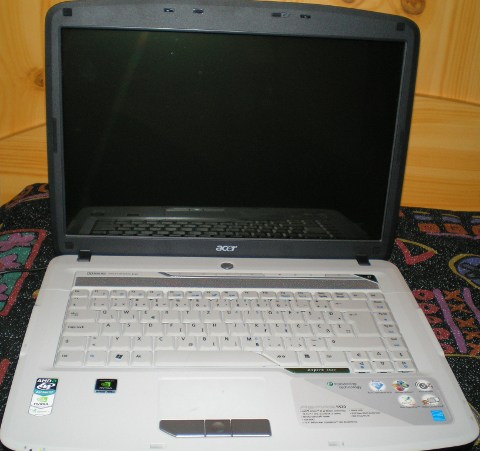02.10.13
Links 10/2/2013: Ubuntu on Phones This Month, Linux Year on Desktop
![]()
Contents
GNU/Linux
-
Shock! Horror! Some People Want To Change The Linux Console
-
Desktop
-
Chromebooks Pick Up Steam with CDW Deal
-
Winning The Desktop Wars
Chris Hall over at Foss Force wrote an article that I’ve been mulling over writing myself for quite some time. Chris claims that Linux has won the “war for the desktop”, and on top of that, won it a long time ago with Android. However, I’m not quite as enthusiastic about his claims of open source superiority. Did open source really win, or have we been hijacked?
Let’s take a second and think about the nature of the open source movement for a few minutes. There are several reasons why we would want the software we use to be open to examination: fewer bugs, control of the machines we own, the ability to modify and redistribute programs, the list goes on. However, I believe that the core ideal of open source is not actually freedom per se, but control. We want to be able to control when and how our machines are used, and when and how our data is used, and to ensure that control access to the source code is necessary.
-
-
Kernel Space
-
Features Coming In For The Linux 3.9 Kernel
While the Linux 3.8 kernel hasn’t even been released yet, several of the noteworthy features slated to be merged for the Linux 3.9 kernel are already known.
More of the features of the Linux 3.9 kernel will be known as soon as its merge window opens in the coming weeks following the 3.8 availability, and as the “-next” branches for the different subsystems are finalized, but here’s some of the work that’s already queued up:
- Kernel mode-setting locking has come courtesy of Intel. This work is to move in the direction of “perfect page-flipping”, but it’s not there quite yet even after the invasive changes caused by this locking work. The changes are to avoid blocking KMS background functions when ioctls being frequently hit by the compositor are called, in order to reduce dropped frames. So while this isn’t some sexy end-user feature, it’s an important improvement to the KMS/DRM infrastructure.
-
The Linux Kernel Console Is Being Killed Off
David Herrmann has provided an update on his ambitious initiative to kill of the Linux kernel console. Herrmann has long been working on making the Linux kernel CONFIG_VT option unnecessary for providing a Linux console by punting it off to user-space. The Linux kernel VT console hasn’t been changed much in the past two decades and Herrmann is hoping to see it replaced with a user-space solution he’s been developing that would allow for multi-seat support, a hardware-accelerated console, full internalization, and other features.
-
KVM Founders Build Cloud Hypervisor at Ravello
In 2008, Linux vendor Red Hat acquired virtualization startup Qumranet for $107 million. The core team behind Quamranet’s KVM open source virtualization hypervisor has since moved on to found a new startup called Ravello that is aiming to bring enteprise applications to the cloud.
Ravello Systems emerged from stealth this week with a beta product release and funding of $26 million in venture capital.
“The technology that we have developed allows us to completely encapsulate an application and its infrastructure so it can run on any cloud,” Navin Thadani, SVP of Products at Ravello told Datamation.
Ravello calls its technology a Cloud Application Hypervisor and it is initially being offered in a Software-as-a-Service model.
-
Graphics Stack
-
Mesa Threading Support Is Slow, Still Being Developed
-
Intel’s Linux DRM Driver Plans For 2013
Daniel Vetter of Intel’s Open-Source Technology Center talked this weekend about recent and future improvements being worked on for the company’s open-source DRM graphics kernel driver.
-
-
Applications
-
Desktop Environments/WMs
-
GNOME Desktop/GTK
-
PyGObject 3.7.5 Improves Support for non-C99 Compilers
PyGObject 3.7.5 has been announced on February 5 and it brings various internal improvements, as well as many bug fixes.
-
-
-
Distributions
-
New Releases
-
PCLinuxOS/Mageia/Mandrake/Mandriva Family
-
Red Hat Family
-
JBoss is juicy, but Vert.x could bring sexy back to Red Hat
Seven years after Red Hat snatched JBoss out from under Larry Ellison’s nose, the enterprise Linux distributor is continuing to squeeze the juice from the open-source application server.
Red Hat spent $350m buying JBoss in 2006 and today it forms the technology backbone and the brand-name basis of Red Hat’s enterprise middleware suite.
And, as Red Hat grows, so does JBoss – with customers who pick Red Hat Enterprise Linux increasingly making JBoss their app server of choice.
-
-
Debian Family
-
Derivatives
-
Canonical/Ubuntu
-
Ubuntu Smartphones From Samsung: Targeting BlackBerry 10 In October?
-
Top 10 Ubuntu App Downloads for January 2013
-
Ubuntu for Galaxy Nexus phones to arrive in February
Ubuntu main man Mark Shuttleworth says plans are on track to produce smartphones running a mobile variant of the Ubuntu Linux OS by October 2013, but developers should be able to start working with the platform even sooner.
-
-
-
-
-
Devices/Embedded
-
Phones
-
Ballnux
-
Android
-
Samsung: The only Android smartphone maker that matters
The latest smartphone figures from analyst firm comScore show that Samsung is pretty much the only Android phone maker that matters.
-
Tablets rising: Apple No.1, Samsung No. 4 ‘PC makers
It’s not just smartphones — Apple and Samsung are leading the charge in PCs, which include tablets, according to market researcher Canalys.
-
Q4 Smartphone Shipments Reflect Android and Samsung Momentum
-
-
-
Sub-notebooks/Tablets
-
Content-Creation – The Third Option
They deny the current assault by */Linux on ARM or x86/amd64 as incapable of replacing Wintel in any manner. That’s clearly wrong on many fronts.
-
Microsoft getting squeezed between Chromebook and iPad
-
The Wikipad is back (but smaller) and Ouya will get annual updates
-
-
Free Software/Open Source
-
Oracle/Java/LibreOffice
-
Rethinking the office suite
I’ve spent much of the last week exploring the recent releases of Calligra Suite and LibreOffice, and listening to the unlikely rumors of a Linux version of Microsoft Office. I haven’t concentrated on office suites so intensely for years, and, as I examined Calligra Suite’s and LibreOffice’s very different layouts and approaches to productivity, I found myself thinking: What should a modern office suite consist of?
-
If Office Suites Are Not Broken, Why Change Them?
He has some reasonable observations but IMHO office suites work well. They are more or less perfected. There’s no reason at all for restructuring or slapping on rafts of new features. That’s M$’s business-plan to force constant updates/new licence-sales. We don’t need that with LibreOffice. Improving its efficiency, fixing bugs and making small changes to UI/features make sense. Rethinking to the extent of adding “the ribbon” or linking to clouds is not needed and not useful. We can run an office suite as a thin client already. What more do we need?
-
-
Funding
-
BSD
-
BSDs Struggle With Open-Source Graphics Drivers
While there’s plenty of code pouring into the Linux world for bettering open-source graphics drivers from desktop graphics cards to ARM SoCs, in the *BSD world they are struggling with their graphics driver support. Matthieu Herrb gave a presentation on the (rather poor) state of graphics on Unix-like platforms outside of Linux.
-
-
Project Releases
-
Public Services/Government
-
French Department of Defence Wants to Choose Slavery
Let’s hope reason prevails. The benefits of reliable IT and reduced costs by the national police, German city of Munich and Peugeot using GNU/Linux are obvious and Defence should want the same benefits.
-
-
Openness/Sharing
-
Open Access/Content
-
Aaron Swartz and the Corrupt Practice of Plea Bargaining
If Ortiz thought Swartz only deserved to spend 6 months in jail, why did she charge him with crimes carrying a maximum penalty of 50 years? It’s a common way of gaining leverage during plea bargaining. Had Swartz chosen to plead not guilty, the offer of six months in jail would have evaporated. Upon conviction, prosecutors likely would have sought the maximum penalty available under the law. And while the judge would have been unlikely to sentence him to the full 50 years, it’s not hard to imagine him being sentenced to 10 years.
In this hypothetical scenario, those 10 years in prison would, practically speaking, have consisted of six months for his original crime (the sentence Ortiz actually thought he deserved) plus a nine-and-a-half-year prison term for exercising his constitutional right to a trial.
-
The inside story of Aaron Swartz’s campaign to liberate court filings
And how his allies are trying to finish the job by tearing down a big paywall.
-
-
Leftovers
-
Security
-
Defence/Police/Secrecy/Aggression
-
‘CIA lies even to those inside agency’ – ex-spy Kiriakou
-
Brennan’s CIA Confirmation Hearing as ‘Kabuki Oversight’ & Anwar al-Awlaki’s Posthumous Trial
Nobody doubts that Obama’s counterterrorism adviser John Brennan, who has been serving as an assassination czar developing a targeted killing program, will be confirmed to the position of CIA chief. In that sense, Jeremy Scahill was completely right to describe what the press and public saw yesterday during the confirmation hearing as “kabuki oversight.”
-
Incoming CIA boss says covert drone strikes are ‘last resort’
-
JOHN BRENNAN AND THE “SO-CALLED” AMERICANS
“One of the problems is, once the drone program is so public, and one American is caught up, people don’t know much about this one ‘American citizen’—so called,” said Senator Dianne Feinstein, in her questioning of John Brennan, President Obama’s nominee for C.I.A. director, on Thursday. (John Cassidy has more on the hearing.) She was referring to Anwar al-Awlaki, who was killed by a drone strike in Yemen, in 2011, and was a “so-called” American because he was an American, born in New Mexico. “They don’t know what he’s been doing,” Feinstein continued. “They don’t know the incitement he has stirred up. I wonder if you could tell us a little bit about Mr. Awlaki and what he’s been doing.”
-
5 Questions John Brennan Dodged in His CIA Confirmation Hearing
The Senate intelligence committee hearing on John Brennan’s nomination to head the Central Intelligence Agency was interrupted five times by protesters before Sen. Dianne Feinstein (D-Calif.), who chairs the committee, ordered the chamber emptied. One of the protesters, as she was being hauled off by police officers, urged members of Congress to “do your job.”
-
Statement on John Brennan’s Admission to CIA and NYPD’s Arrangement on Spying on American Muslims
-
The law of war does not shield the CIA and John Brennan’s drone kill list
-
Obama and Drones
Though this might sound like a “cold war liberal” defending CIA-led coups and military interventions, I support President Obama’s drone attacks.
And I admit that I’m a hypocrite.
-
Brennan Hearings: What is the Legal Basis for Drone Targeted Killings?
-
There’s No Way to Hold Obama to Account When Drones Kill Innocents
Even if he has the authority to order strikes on Al Qaeda, that doesn’t justify keeping quiet when noncombatants are hit instead.
-
Pentagon Continues Contracting US Companies in Latin America
The Pentagon signed $444 million in non-fuel contracts for purchases and services in Latin America and the Caribbean during the 2012 fiscal year, an overall decrease of nearly 15% from the previous year. But US military spending in the region is still considerably higher than during the George W. Bush administration, when the equivalent Pentagon spending in Latin America averaged $301 million a year.
FOR conducted an analysis of Defense Department contracts listed on usaspending.gov for Fiscal Year 2012, building on the review we did last year.
-
The Cost of War Includes at Least 253,330 Brain Injuries and 1,700 Amputations
Here are indications of the lingering costs of 11 years of warfare. Nearly 130,000 U.S. troops have been diagnosed with post-traumatic stress disorder, and vastly more have experienced brain injuries. Over 1,700 have undergone life-changing limb amputations. Over 50,000 have been wounded in action. As of Wednesday, 6,656 U.S. troops and Defense Department civilians have died.
-
-
Cablegate
-
Interview with Julian Assange
-
WikiLeaks Assange: ‘You Can Be Killed By Someone in White House For Completely Arbitrary Reasons’
-
Assange urges leak of US drone rules
WikiLeaks founder Julian Assange urged US officials Friday to leak secret documents on drone strikes, saying that the broad discretion to kill citizens showed a “collapse” in the American system.
Assange, who has angered US officials by releasing thousands of secret memos, used a rare US television appearance to condemn President Barack Obama’s controversial green light to kill American citizens who conspire with Al-Qaeda.
-
Lucio Gutierrez says it could revoke asylum to Assange if he wins election
-
New Wikileaks E-mail Dump Shows Wasted Drone Efforts
Less noticed was another related development: Wikileaks this week released another round of E-mails sent by private intelligence company Stratfor, several of which shed light on the quest to capture Awlaki. WhoWhatWhy.com, a nonprofit investigative journalism site which first analyzed the E-mails, says what’s most interesting about them is their candor.
-
-
Finance
-
Governments Save By Paying Down Their Debts
I think this over-states the case against the US government buying equities, but the deeper problem is that it ignores the government’s $11 trillion in national debt. If a heavily indebted individual wanted to save for the future, a financial advisor would probably tell him the first step is to pay off some of his debts. And the same point applies to the United States. It will be a long, long time before we run out of bonds to retire—so long that it’s silly to worry about what we’d do if we retired the national debt and still had more money we wanted to save.
-
Goldman Sachs hedging its bets: Is more economic pain on the way?
Investment bankers – can’t live with ‘em, and can’t live without ‘em.
At least that’s how it seems in these tough economic times. We tend to hang on their every word, as if they truly know how big money intends to manipulate financial markets in the foreseeable future. But we also tend to blame these financial powerhouses for creating the worst recession since the Great Depression.
[...]
…1 trillion flowed out of equities during the month of January.
-
-
PR/AstroTurf/Lobbying
-
The Gates Foundation and Coca Cola at Odds or Legitimate Bedfellows?
Sanjay Basu, assistant professor of medicine at Stanford University, recently wrote a blog post that caught our eye about public and nonprofit leaders who sit on the corporate boards of major soda companies like Coca-Cola and PepsiCo. Using one of the tools that make such information readily available, NNDB Mapper, he argues that there appear to be institutional conflicts of interest occurring. In particular, Basu calls out Cathleen Black, chancellor of New York City Schools, and several key Gates Foundation leaders, for sitting on Coca-Cola’s board. In addition, he notes that the former president of the Ford Foundation and the CEO of Duke Health System sit on the board of Pepsi.
-
-
Censorship
-
Russia blacklists site hosting blogs of prominent journalists
The Russian government has blocked access to a blog-hosting site that publishes reports from at least two prominent independent journalists often critical of the Kremlin. The site has been added to the country’s recently established official “internet blacklist.”
LJRossia.org, also known as InsaneJournal, is “a non-profit project created to support freedom of speech, civil society and encourage the free exchange of ideas.” The site was censored today, reportedly over two posts that contained “child pornography elements.” But instead of blocking or removing the two posts in question, the entire site is inaccessible on at least one Russian ISP, RosTelekom.
-
-
Civil Rights
-
NSA Whistleblower Thomas Drake: NDAA Lawsuit Update
-
Alexa O’Brien: NDAA Lawsuit Update
-
In a Major Privacy Victory, Seattle Mayor Orders Police to Dismantle Its Drone Program After Protests
In an amazing victory for privacy advocates and drone activists, yesterday, Seattle’s mayor ordered the city’s police agency to cease trying use surveillance drones and dismantle its drone program. The police will return the two drones they previously purchased with a Department of Homeland Security grant to the manufacturer.
EFF has been warning of the privacy dangers surveillance drones pose to US citizens for more than a year now. In May of last year, we urged concerned citizens to take their complaints to their local governments, given Congress has been slow to act on any privacy legislation. The events of Seattle proves this strategy can work and should serve as a blueprint for local activism across the country.
-
DHS Watchdog OKs ‘Suspicionless’ Seizure of Electronic Devices Along Border
The Department of Homeland Security’s civil rights watchdog has concluded that travelers along the nation’s borders may have their electronics seized and the contents of those devices examined for any reason whatsoever — all in the name of national security.
The DHS, which secures the nation’s border, in 2009 announced that it would conduct a “Civil Liberties Impact Assessment” of its suspicionless search-and-seizure policy pertaining to electronic devices “within 120 days.” More than three years later, the DHS office of Civil Rights and Civil Liberties published a two-page executive summary of its findings.
-
Every Laptop and Cell Phone in Detroit (and Dearborn) Can Be Searched at Will
-
Government watchdog: Warrantless laptop searches at border are A-OK
Civil liberties office releases executive summary but full report is secret.
-
-
DRM
-
A Brilliant Parody of DRM
But this post, in which he defends his decision to disallow cutting and pasting from his website, brings to mind another theory: Quinn is secretly an advocate of copyright reform, and has adopted the cartoonish “IP Watchdog” persona as an act of satire. Disabling cutting and pasting is such a ludicrous idea that it can’t be a serious business decision. But it brilliantly lampoons the fallacies that have caused major content companies to employ similar (and similarly ineffective) copy protection schemes.
-
-
Intellectual Monopolies
-
Copyrights
-
hy Do Copyright Monopolists Think They Can Just Steal Somebody Else’s Work?
-
Pro File-Sharing Professors ‘Hunted Down’ by the Copyright Lobby
When professor of multimedia Roger Wallis took the stand during The Pirate Bay trial in 2009, he had to endure several personal attacks. Movie and music industry lawyers did their best to discredit Wallis’ reputation and research. In the Pirate Bay documentary TPB AFK the professor says that these attacks are not unique, and that pro-file-sharing researchers are “hunted down with a whip” by pro-copyright fo
-
-
-





















 Content is available under CC-BY-SA
Content is available under CC-BY-SA